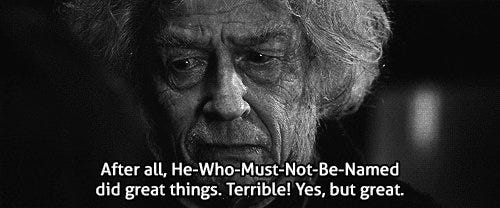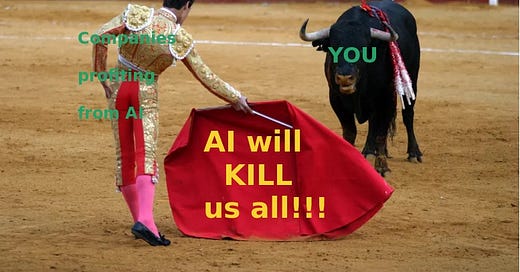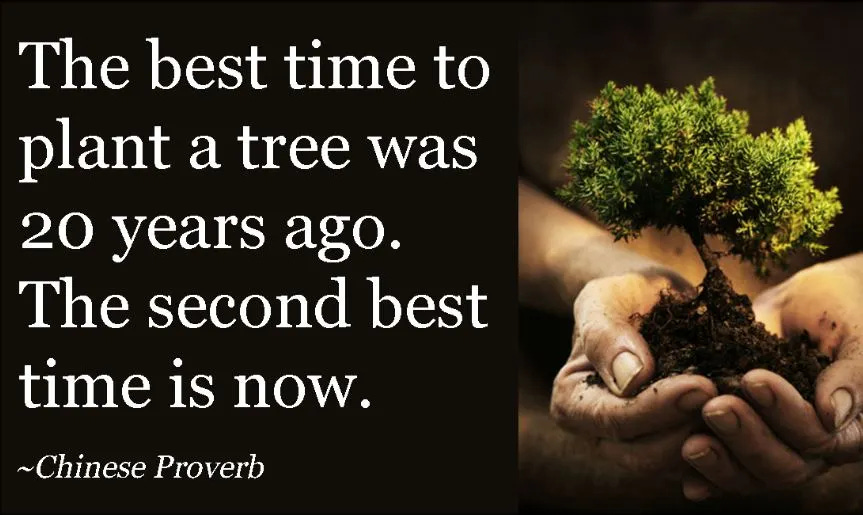Innovation scams, education myths and what they mean for parents (and everybody else)
Just some career-building tips for innovation-ready parents, their children... and the rest of us.
A few days ago I described what real innovation should look like. Here, I discuss how parents should keep all those issues into account when considering the future of their children, and where and how to spend for their "education". However, knowing how the limits of today's (mainly) digital innovation interact with education is relevant for everyone, according to my long-time slogan "your rights and the quality of your life depend every year more on how software is used AROUND you".
Innovation-preparedness for my children, where art thou?
Everything I wrote about innovation has direct impacts on education, careers and having a decent life in general. Here are some of the main points to connect with those in that article, before spending a fortune on "the best schools", relocating just to access them, or burying kids under extracurricular activities to "give them a head start":
POINT 1: Generation Y was the first generation...
to be universally told that they would need university-level degrees to succeed. So far, this faith has already greatly depleted "all trades that allow the world to keep on humming", while leaving a non-negligible part of those adults with work-related depression pretty much everywhere (e.g. Asia, Europe, USA), student debt and, which is the most important point here, hardly better expectations on the same fronts for their children.
POINT 2: Certain genies are out of the bottle,
but not in the ways that many fear, and others like to wave like red rags to a bull.
Artificial Intelligence (AI), for example, cannot directly, actually kill us all, unless WE literally beg it to do so. Don't worry about that too much, when there is another issue that surely exists and is much more urgent: even if further development of Artificial Intelligence ended while you read this sentence, we will still see serious social changes in the next years (with the work-related ones likely being the least relevant), just from the deployment and widespread accessibility of AI that ALREADY exists.
Above all, the actual unemployment genie out of the bottle here is not AI, or Robots. It never was.
POINT 3: Software is the new plastic.
The news is not "AI and robots": it's software that is getting everything around and even inside us, literally, down to the DNA itself.
Globalization and free markets would have been much smaller in a world without software digitizing everything from container shipping to predatory, but socially fashionable gambling. Politics, democracy, sex and dating would be quite different without dopamine-force-feeding software, I mean "social media".
Now and in our foreseable real future, robots are little more than software moving puppets or mechanical devices by itself. The AI that gets most headlines in these weeks is just software that writes, talks or draws well enough to make passers-by go "gee, ain't that cool". Much of the consumer-oriented Internet of Things and "Smart X" products are just software forced, because profit, into obiects that never had any serious reason to be connected to the Internet and be unrecyclable e-waste when they break.
The actual root problem here is "just" that software is like alphabets and writing: once it gets into people's hands, which it did decades ago, it's not really containable anymore. Worry about what software in general means today and tomorrow for your kids, both risks and opportunities, longtermism be damned:
POINT 4: AI and robots will continue to be used to eliminate jobs
Of course they will. But even here there is a lot to confusion to avoid, when planning yours or your kids work-related future.
In that context, for example, the definitions of AI and robots given in point 3 can be quite distracting. Both AI and Robots can do a lot of good, badly needed stuff that would be impossible otherwise, under many different names. In the context of this article, however, their three most relevant names may be, taking "Artificial" as shortcut for "won't strike, get sick or get pregnant, ever":
Artificial Blue Collar,
Artificial White Collar
and Artificial Middle Manager or freelance Professional
Trust me: using those terms, instead of made-for-memes monikers like Artificial Intelligence or Robots, would make a lot of debate and planning on school choices (or voting) much smoother and more rational. Ditto for always saying "people will use AI and robots to eliminate jobs" instead of the fake news that "AI and robots will eliminate jobs". As someone who really knows her stuff recently said, "This frames technology not as a tool to help us exist how we want to exist, but as a thing that has to exist, and we have to bend to its will. Very strange framing".
Resist distractions! Concerns about robots replacing humans already distract from humans being robotized, even more since the pandemic. "Manna", that is fully automated micro-management of human employees, graduated to reality years ago. Today, it's just moving up the corporate ladders, approaching the same steps with high- and middle-level "job titles" that many of its future human competitors may have to get in debt up to their necks to reach.
POINT 5: Question function and meaning of schools and universities, already!
If THE purpose of school and universities really were to help young people to secure great jobs and careers, a direct consequence of the previous points is that they failed more than they succeeded, and will continue to do so as long as their pupils keep coming for that same wrong reason. As a minimum, some damage control is needed here.
Assuming that "getting a successful a career" is the main purpose of going to school and then college, the safest education choices for most students may be the ones closer to "career paths" less vulnerable to software. Until humans remain human, which is up for debate, at several levels. More on this below.
POINT 6: The IDENTITY of innovation, both fake and real, changes as we age
This postulate, in which by "we" I mean "the whole society", is the main conclusion I reached after reading "Age and the Nature of Innovation". That article explains that there are different types of innovation, and that each of those types is more likely to come by individuals in an equally specific, relatively narrow age range.
I postulate that if that is the case, it works both ways: if the innovation I can produce depends on (also) on my age so does what I am more likely to identify as "innovation".
If this is correct, a little banal corollary is that what any society as a whole rewards as "innovation"...
changes significantly over time, as the average age and age distribution of that society change
and changes with the same speed, but much less predictability, since "rewards", "recognize" and "actually need" can be very different beasts...
In career-planning terms, this means that, when choosing a degree or campus, checking which one has the highest percentage of Alumni who successfully rode the innovation waves to reach the highest salaries until today may be just as effective as tossing a coin.
Considering as the world is doing now, the only future-proof advice, that is, may be the last sentence of that article: put [you or your kids, at any age] "in the position to encounter ideas that are new to them, if not new to the world" (note that it says "ideas", not "buzzwords" or "fads").
Hilariously (not), encountering new ideas is just the opposite of "avoiding all colleges in ENTIRE states for political reasons", which is what a full quarter of college applicants in the US did this year. That's socio-political hypercoagulation, not innovation.
Summarizing...
Summarizing, that part of education called "schooling, to get a degree" will not save your kids. Not alone, by a long shot, especially if it aims in the wrong directions.
Maybe the "generation of young men that gave up on college" has just realized what was already evident in 2011, when Krugman wrote: "the notion that putting more kids through college can restore the middle-class society we used to have is wishful thinking. It's no longer true that having a college degree guarantees that you'll get a good job, and it's becoming less true with each passing decade".
Twelve years later, though, too many parents are still hyperfocused on overparenting to accelerate "elite overproduction", by preparing kids to compete in the wrong contests, or yesterday's contests, out of "a dull desperation to keep said kids “marketable".
This, not "AI will kill us" is an existential challenge: the fact that, decades after the trends described in "Degrees and Dollars" and many other similar warnings started, too few parents grasp that:
well-schooled workers of tomorrow will NOT be "clear winners", or able to pay their parents pensions in any direct or indirect way, just because they were well-schooled
college degrees (in EVERY field, including the STEM ones now making headlines for Big Tech layoffs!) "may be no more than tickets to jobs that don’t exist or don’t pay middle-class wages"
Let's be positive now: what should parents DO?
First, don't despair! Believe it or not, none of the above is a reason to not have kids, or to give up hopes that they'll have a great life.
Second, stop calling "innovation" the fads I described, and definitely stop funding them personally. If you still have money for stocks, buy something else. Both to save your own pensions from overhyped tech gambling, and for your kids' future if you are a parent, or planning to become one.
As far as your kids' future is concerned, I'd say that the main questions every parent has to answer personally, but keeping into account everything you just read, could be:
what are the best, or least risky career paths to bet on?
what is the best way to prepare kids for those, or any other career?
what is the purpose of education anyway?
would any answer to the previous questions be different for sons and daughters? Should it? How, and why?
I plan to write more about these topics in this newsletter, so please subscribe to not miss new issues! In the meantime...
Right now, I have no answers for the fourth question. Seriously. I put it there because I am looking for answers. Do you have any?
For the first question, please realize that my insistence on the problems caused by AI, robots and software does NOT mean that nobody should aim to study and work in those fields!
Specific software products or services are almost always non-neutral, and can be intrinsically evil by design (e.g. the gambling or dopamine ones mentioned above). But software in and by itself is not another "It Who Must Not Be Named". It's a wand that hands can grab to make many great things, including many terrible ones. How the hands were educated is the problem, not the wand.

Software is too powerful to leave it entirely to programmers, and it's not programmers who need new Hippocratic Oaths. Teachers, philosophers… Anything that helps software wizards work FOR society may be a worthwhile field of studies, or career. Heck, some problems with AI come exactly from raising it like we raised some children!
In general, the best if not the only jobs left from the interaction of fake innovation with the other crises of our time will be those that DO connect dots, instead of creating them, and do NOT create unnecessary solutions in search of some problem. That is, the jobs with at least one of the following characteristics:
jobs with a generalist approach and vision, rather than those needing hyper-specialized skills
jobs based on direct, continuous, real care, or maintenance and restoration of either real human beings (caregiving, teaching, arts...) or real environments (agriculture, urban habitats, craftmanship...).
Moving to the second question, I am quite confident that many critical skills for those or any other job will not be learned or acquireable in structured, adult-supervised activities, be they schools or any extracurricular course, paid or not. One is surely reading a lot, ALL kinds of stuff, and loving it. Reading for the pleasure of it is its own reward, but we know since (at least) 2010 that "Books in home are as important as parents' education in determining children's education level".
Without excluding knowledge of digital stuff (3D printing, web design...), I am equally confident that purely manual, totally unplugged ones skill, from cooking or sewing to carpentry, are equally important, because "brains cry out for more multisensory work". On to the third question now.
What is the purpose of education anyway?
My point 5 and the disappearance of the "trades that allow the world to keep on humming" are not an invitation to "not waste time studying, get a real job instead". Not at all.
All those points are reasons to keep "education" as separate as possible from "aiming to a specific career path".
The purpose of education is to become the best human being you can be. The more education one gets, the better it is, both for that person, and for society as a whole.
Providing all the skills and specific knowledge that are needed to secure a specific job is the purpose of professional training courses. Society-wise, mixing those two purposes is a great tragedy of our time. At a lower level, is one of the reasons why both recruiters and job seekers are going bonkers, and many job ads are fake.
Yes, of course this is not true, or possible, in all cases. You cannot become a good surgeon, if that's your call, without studying medicine for many years. If your kid was born to be a great programmer, lawyer, philosopher, whatever... sure, go ahead and spend all you can on that path. I mean it. I am just saying:
stop considering degrees as THE life jacket that is necessary and worth paying, for the specific purpose of finding a good job
do all you can to guarantee your kids the best education, but for that OTHER purpose only
don't ever espect or demand that your kids get a job corresponding to the college they went to, or want to go, even if you fully paid for it. Don't tolerate the same attitude in them
The fact that practically every modern society will soon require new armies of nurses, carpenters, plumbers, gardeners, farmhands and so on is not a reason to neglect education as in "acquiring knowledge". There is no reason for a janitor or agricultural worker to be ignorant. There is no reason for anybody with any "menial" job to not have the knowledge and wish to go to the opera, blogging about philosophy or searching for fossils on weekends.
Nor there is any reason for someone who managed to get a degree because he just liked that subject, and then become "just" a baker, to feel ashamed or be considered a failure. No damned reason at all. Not in a decent world for sure.

This is important. Even if YOU will never be a parent
Education is like demography, or trees: it takes decades to bring fruits, or consequences. Like with trees, the best moment to fix parents misconceptions about education was twenty years ago, the second best time is now.
Even those who will never have kids themselves need a working society around them, for the rest of their lives. Everybody, that is, needs to have around people who, regardless of who sired them and where, got both an education (regardless of degrees) and a job that really make sense. We have already wasted at least one generation chasing the innovation and education fads I described. Therefore...
Share this as much as you can, online and offline. Make every parent's association, mom or teacher club read it.
Let's discuss this! Specific conclusions are left as exercise for each parent, but please leave them in the comments too. If you don't want to subscribe to Substack just to comment, email me directly
Unavoidable self-promotion: I plan to write much more about the problems of parenting in a tech age in future issues, and I would LOVE to directly interact with parents worldwide, to explore the same issues. But I can only do if YOU allow me to do it. Please subscribe, possibly with a paying subscription, and invite all the parents you know to do the same








EVERY single point I made in this post is true in India, maybe even more than elsewhere, according to Bloomberg:
Worthless Degrees Are Creating an Unemployable Generation in India
https://www.bloomberg.com/news/articles/2023-04-17/india-s-worthless-college-degrees-undercut-world-s-fastest-growing-major-economy
oh boy... check out this great confirmation, just in from Wired, of many of the points I made in this article: https://www.wired.com/story/plaintext-tech-layoffs-reveal-americas-unhealthy-obsession-with-work/